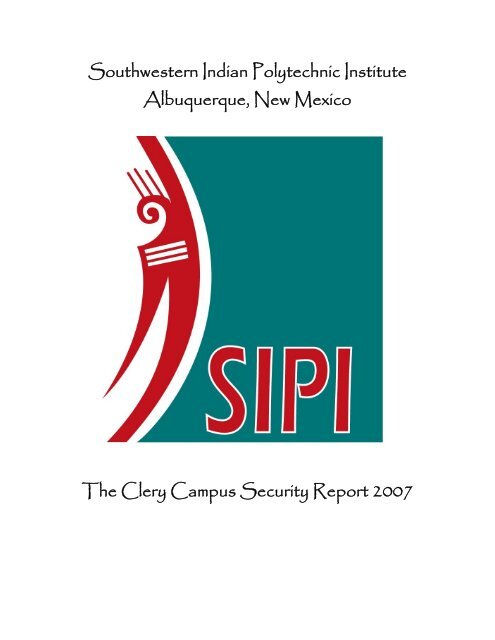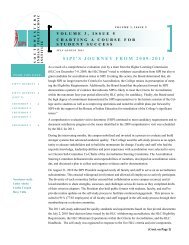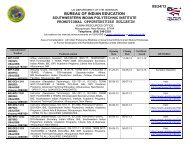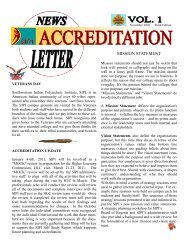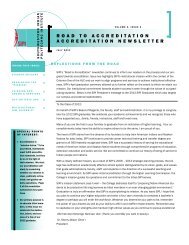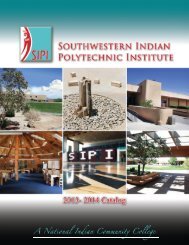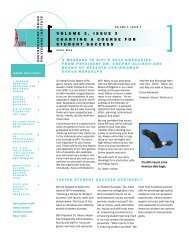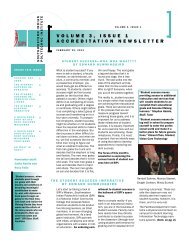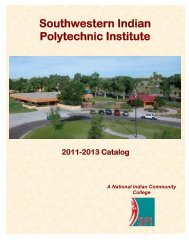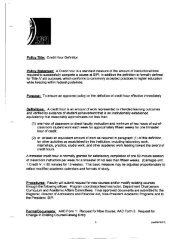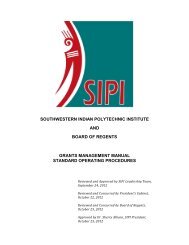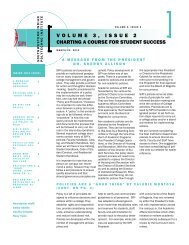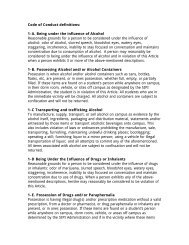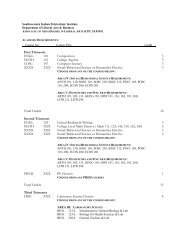Southwestern Indian Polytechnic Institute Albuquerque, New Mexico ...
Southwestern Indian Polytechnic Institute Albuquerque, New Mexico ...
Southwestern Indian Polytechnic Institute Albuquerque, New Mexico ...
You also want an ePaper? Increase the reach of your titles
YUMPU automatically turns print PDFs into web optimized ePapers that Google loves.
<strong>Southwestern</strong> <strong>Indian</strong> <strong>Polytechnic</strong> <strong>Institute</strong><strong>Albuquerque</strong>, <strong>New</strong> <strong>Mexico</strong>The Clery Campus Security Report 2007
In accordance with The Jeanne Clery Disclosure of Campus Policy and CampusCrime Statistics Act, also known as The Clery Act, the <strong>Southwestern</strong> <strong>Indian</strong><strong>Polytechnic</strong> <strong>Institute</strong> (SIPI) provides information about campus crime to makestudents, faculty, staff, and the public aware of any crime that may occur oncampus.The Clery Act requires higher education institutions to give timely warnings ofcrimes that may represent a threat to the safety of anyone on campus, and tomake public all campus security policies. It also requires that crime data becollected, reported, and disseminated to the campus community and submitted tothe U.S. Department of Education. The act is intended to provide students,prospective students and their families with accurate, complete, and timelyinformation about safety on campus, so that they can make informed decisionsabout the relative safety of the institution.The Clery Act requires all private and public postsecondary institutionsparticipating in Federal Title IV student aid programs to comply with Clery Actregulations. All Title IV institutions have signed Program ParticipationAgreements (PPA) with the U.S. Department of Education to administer Federalstudent aid programs.These programs include: Pell Grants, Federal Supplemental EducationalOpportunity Grants (FSEOG), the Federal Work Study Program, Federal PlusLoans, the Federal Family Education Loan Program (FFELP), the Direct LoanProgram, and the Leveraging Education Assistance Partnership (LEAP).- 1 -
Annual Disclosure of Crime StatisticsSIPI’s Security and Safety Office, in compliance with the Jeanne Clery Disclosureof Campus Security Policy and Crime Statistics Act, has prepared this CleryCampus Security Report for 2007. A copy of SIPI’s annual Security Report isavailable to current students, faculty, and staff, as well as prospective studentsand employees. This report includes statistics for the past three years onreported crimes that occurred on campus; in on-campus buildings or propertyowned or controlled by SIPI; and on property within, or immediately adjacent toand accessible from, the campus. The report also includes institutional policiesconcerning campus security and other related matters.A copy of this report may be obtained by contacting SIPI’s Security and SafetyOffice or accessing the following website: http://www.sipi.bia.edu. In addition tomaking the report readily available via the website, employees are notified viaemail of the report’s release; and it is also made available in high-traffic areas ofthe campus, such as libraries and dormitories. Copies of the report may also beobtained at the SIPI Security and Safety Office or the Admissions Office, bothlocated in the Administration Building. Statistical information on crimes reportedon the SIPI campus, and other higher education institutions, can also be foundon the U.S. Department of Education’s website:http://ope.ed.gov/security/index.asp.The Clery Act requires institutions to disclose three general categories of crimestatistics:1. Types of Offensesa. Criminal Homicide, including:i. Murderii. Non-Negligent Manslaughteriii. Negligent Manslaughterb. Sex Offenses, including:i. Forcibleii. Non-forciblec. Robberyd. Aggravated Assault2. Hate Crimes. Disclose whether any of the above-mentioned offenses, orany other crimes involving bodily injury, were hate crimes.3. Arrests and Referrals for Disciplinary Action for illegal weaponspossession and violation of drug and liquor laws- 2 -
SIPI Crime StatisticsCriminal OffensesCriminal Offenses: On CampusYear: 2004 2005 2006a. Murder/Non-negligent manslaughter 0 0 0b. Negligent manslaughter 0 0 0c. Sex Offenses - Forcible 0 0 0d. Sex Offenses - Non-forcible (Incest and statutory rape) 0 0 0e. Robbery 0 0 2f. Aggravated assault 1 3 6g. Burglary 0 1 0h. Motor vehicle theft 0 0 0i. Arson 0 0 0Criminal Offenses: Residence HallsYear: 2004 2005 2006a. Murder/Non-negligent manslaughter 0 0 0b. Negligent manslaughter 0 0 0c. Sex Offenses - Forcible 0 0 0d. Sex Offenses - Non-forcible (Incest and statutory rape) 0 0 0e. Robbery 0 0 0f. Aggravated Assault 0 2 1g. Burglary 0 1 0h. Motor Vehicle Theft 0 0 0i. Arson 0 0 0Criminal Offenses: Public PropertyYear: 2004 2005 2006a. Murder/Non-negligent manslaughter 0 0 0b. Negligent manslaughter 0 0 0c. Sex Offenses - Forcible 0 0 0d. Sex Offenses - Non-forcible (Incest and statutory rape) 0 0 0e. Robbery 0 0 0f. Aggravated Assault 0 0 0g. Burglary 0 0 0h. Motor Vehicle Theft 0 0 0i. Arson 0 0 0Criminal Offenses: Reported by Local and State PoliceYear: 2004 2005 2006a. Murder/Non-negligent manslaughter 0 0 0b. Negligent manslaughter 0 0 0c. Sex offenses: Forcible 0 0 0d. Sex offenses: Non-forcible (Incest and statutory rape) 0 0 0- 3 -
e. Robbery 0 0 0f. Aggravated assault 0 0 0g. Burglary 0 0 0h. Motor vehicle theft 0 0 0i. Arson 0 0 0Hate CrimesA summary of the criminal offenses is listed below which any reportedoccurrences manifest evidence of prejudice as listed below. Data is collected ofthe six types of prejudices, as prescribed by the Hate Crimes Statistics Act(28 USC 534), is as follows:1. Race2. Gender3. Religion4. Sexual orientation5. Ethnicity/ National origin6. DisabilityHate Crimes: On CampusYear: 2004 2005 2006a. Murder/Non-negligent manslaughter 0 0 0b. Negligent manslaughter 0 0 0c. Sex offenses: Forcible 0 0 0d. Sex offenses: Non-forcible (Incest and statutory rape) 0 0 0e. Robbery 0 0 0f. Aggravated assault 0 0 1g. Burglary 0 0 0h. Motor vehicle theft 0 0 0i. Arson 0 0 0j. Any other crime involving bodily injury 0 0 1Hate Crimes: On Campus Residence HallsYear: 2004 2005 2006a. Murder/Non-negligent manslaughter 0 0 0b. Negligent manslaughter 0 0 0c. Sex offenses: Forcible 0 0 0d. Sex offenses: Non-forcible (Incest and statutory rape) 0 0 0e. Robbery 0 0 0f. Aggravated assault 0 0 1g. Burglary 0 0 0h. Motor vehicle theft 0 0 0i. Arson 0 0 0j. Any other crime involving bodily injury 0 0 0- 4 -
Hate Crimes: Public PropertyYear: 2004 2005 2006a. Murder/Non-negligent manslaughter 0 0 0b. Negligent manslaughter 0 0 0c. Sex offenses: Forcible 0 0 0d. Sex offenses: Non-forcible (Incest and statutory rape) 0 0 0e. Robbery 0 0 0f. Aggravated assault 0 0 0g. Burglary 0 0 0h. Motor vehicle theft 0 0 0i. Arson 0 0 0j. Any other crime involving bodily injury 0 0 0Hate Crimes: Reported by Local and State PoliceYear: 2004 2005 2006a. Murder/Non-negligent manslaughter 0 0 0b. Negligent manslaughter 0 0 0c. Sex offenses: Forcible 0 0 0d. Sex offenses: Non-forcible (Incest and statutory rape) 0 0 0e. Robbery 0 0 0f. Aggravated assault 0 0 0g. Burglary 0 0 0h. Motor vehicle theft 0 0 0i. Arson 0 0 0j. Any other crime involving bodily injury 0 0 0ArrestsFor the criminal offenses listed below, the statistics do not include drunkennessor driving under the influence in liquor law violations.Arrests: On CampusYear: 2004 2005 2006a. Illegal weapons possession 0 0 0b. Drug law violations 1 0 1c. Liquor law violations 4 0 0Arrests: Residence HallsYear: 2004 2005 2006a. Illegal weapons possession 0 0 0b. Drug law violations 1 0 0c. Liquor law violations 0 0 0- 5 -
Arrests: Public propertyYear: 2004 2005 2006a. Illegal weapons possession 0 0 0b. Drug law violations 0 0 0c. Liquor law violations 0 0 0Arrests: Reported by Local and State PoliceYear: 2004 2005 2006a. Illegal weapons possession 0 0 0b. Drug law violations 0 0 0c. Liquor law violations 0 0 0Disciplinary ActionsFor the criminal offenses listed below, the statistics do not include drunkennessor driving under the influence in liquor law violations.Disciplinary Actions: On CampusYear: 2004 2005 2006a. Illegal weapons possession 6 3 1b. Drug law violations 21 12 15c. Liquor law violations 28 19 9Disciplinary Actions: Residence HallsYear: 2004 2005 2006a. Illegal weapons possession 5 2 5b. Drug law violations 38 23 26c. Liquor law violations 54 40 54Disciplinary Actions: Public PropertyYear: 2004 2005 2006a. Illegal weapons possession 0 0 0b. Drug law violations 0 0 0c. Liquor law violations 0 0 0Disciplinary Actions: Reported by Local and State PoliceYear: 2004 2005 2006a. Illegal weapons possession 0 0 0b. Drug law violations 0 0 0c. Liquor law violations 0 0 0- 6 -
Procedures for Employees, Students, and Others toReport Criminal Actions or Other Emergencies on theSIPI CampusSIPI encourages anyone who is the victim of or a witness to any crime occurringon or near the SIPI campus, to promptly report the incident to a SIPI SecurityGuard, as well as the appropriate law enforcement agency.To contact SIPI Security to report a crime or a violation of SIPI’s Articles ofConduct occurring on the SIPI campus, call:1. (505) 263-7531 (SIPI Security Guard on duty)2. (505) 346-2323 (SIPI Security Office)Victims of or witnesses to any crime occurring on the SIPI campus are advisedalso to report the incident to the Bernalillo County Sheriff’s Department (BCSD)at:1. (505) 798-7000 (emergencies)2. (505) 768-4160 (non-emergencies)Victims of or witnesses to any crime occurring within the <strong>Albuquerque</strong> city limits,but outside the SIPI campus, are advised to report the incident to the<strong>Albuquerque</strong> Police Department (APD) at:1. 911 (emergencies)2. (505) 242-2677 (242-COPS) (non-emergencies)To report a fire or medical emergency, call 911.SIPI’s physical address is:9169 Coors Blvd. NW<strong>Albuquerque</strong>, NM 87120Victims of or witnesses to any crime occurring outside the <strong>Albuquerque</strong> city limitsor outside Bernalillo County are advised to contact the law enforcement agencyfor that area.Members of the SIPI community who observe someone drinking and driving areadvised to report it to the DWI Hotline, Toll-free, statewide, at: 1-877-394-4258(1-877-DWI-HALT) or with a cell phone #DWI (#394).Because police reports are public records under <strong>New</strong> <strong>Mexico</strong> state law, lawenforcement agencies cannot hold crime reports in confidence. Under most- 7 -
circumstances, confidential reports for the purpose of inclusion in SIPI’s annualdisclosure of crime statistics can generally be made to certain members of SIPI’scounseling staff.Individuals who wish to report a crime occurring on the SIPI campus and whoprefer that the report remain confidential may report the incident to the followingemployees:‣ Special Needs Counselor (505) 346-2319‣ Substance Abuse Counselor (505) 346-2366SIPI policies and procedures do not allow for all crimes to be reported on aconfidential basis or simply for the purpose of inclusion in SIPI’s annual securityreport. Contact the Special Needs Counselor or Substance Abuse Counselor formore information regarding the circumstances under which reported crimes maynot remain confidential.Security of and Access to SIPI Campus FacilitiesThe Bureau of <strong>Indian</strong> Education (BIE) owns the property upon which the SIPIcampus is located. Because the SIPI campus is, therefore, federal property,access to the campus is regulated by U.S. Department of the Interior (DOI) andBIE policies, and is subject to similar security measures as other DOI and BIEproperties.The <strong>Albuquerque</strong> <strong>Indian</strong> Dental Clinic (AIDC) is also located on the property andis open to AIDC employees, contractors, dental patients and their families, andother visitors to AIDC.Due to increased security precautions at all federal facilities, the only authorizedentrance for vehicles and/or pedestrians is the main campus entrance, which islocated in the northwest section of the campus. This access point leads to andfrom Coors Boulevard. All other gates for vehicular and pedestrian traffic arelocked and off limits unless otherwise posted.All persons entering the campus, and while on the SIPI campus, are required toobtain visitors’ passes as well as parking passes for their vehicles. Valid photoidentification is required at all times by anyone on the SIPI campus or wishing togain access to the SIPI campus, including the AIDC.Federal employees, contractors, and students of SIPI and AIDC are required toobtain non-transferable parking passes for each of their personally ownedvehicles (POV) that they intend to park on the SIPI campus. Non-transferableparking tags are available from the SIPI Security Office, located in Room 111 ofthe SIPI Administration Building.- 8 -
In the event that the Homeland Security Threat Condition increases or if anyother emergency situation exists, such as activation of the Code Adam program,additional security measures will be implemented with little or no advancewarning. In an emergency, the SIPI President or law enforcement may controlaccess to the campus and prevent any individual from entering and/or leaving thecampus.Visiting hours during the regular trimester is from 8:00 a.m. to 10:00 p.m. daily.During trimester breaks in the spring, fall, and winter, visiting hours are limited to8:00 a.m. to 4:00 p.m., unless otherwise posted. Inclement weather, emergencysituations or other unusual circumstances may require changes or alterations toany posted visitation or class schedules.The Administration Building and most academic buildings on the SIPI campusare open at 7:45 a.m., Monday through Friday, and are closed at 4:30 p.m.,although some regularly scheduled classes during the week begin after this time,and other classes may meet on weekends. Appropriate academic buildings willbe opened to accommodate those classes. The Dining Hall and Gymnasiumhave separate hours of operation, which are posted at the main entrances toeach building.The main entrances to the dormitories are open from 7:00 a.m. until 12:00 p.m.All other dormitory doors are locked at all times. The main entrances at thedormitories are the only authorized entrances and exits. All other doors are foremergency use only.Law Enforcement on the SIPI CampusThe Bernalillo County Sheriff’s Department (BCSD), along with the <strong>New</strong> <strong>Mexico</strong>State Police and the Federal Bureau of Investigation (FBI), have law enforcementjurisdiction at SIPI, and are authorized to apprehend and arrest anyone involvedin illegal acts on the SIPI campus and areas immediately adjacent to the campus.SIPI Security Guards do not have power of arrest, but do maintain a workingrelationship with local law enforcement agencies. SIPI Security Guards areauthorized to conduct positive ID checks and to search persons, vehicles, rooms,closets, and containers such as bags and suitcases.Students suspected of violating one or more Articles of Conduct, as defined inthe SIPI Student Handbook, are subject to SIPI’s administrative dispositionprocess, as well as arrest and/or prosecution under applicable laws.Visitors suspected of violating one or more Articles of Conduct, as defined in theSIPI Student Handbook, are not subject to the administrative disposition processitself, but must follow applicable rules of conduct on federal property and are- 9 -
subject to arrest and prosecution under applicable laws, as well as being barredfrom returning to the SIPI campus.The administrative disposition process is outlined in the SIPI Student Handbook,where student rights and responsibilities under federal law and BIA policies arealso outlined.Reporting CrimeSIPI does not have its own police department to investigate crimes occurring onthe SIPI campus. Safety and security is everyone’s responsibility. All victims andwitnesses are strongly encouraged to immediately report any crimes and/orviolations of SIPI’s Articles of Conduct to a SIPI Security Guard or otheremployee under the guidelines previously outlined.Professional CounselorsSIPI’s counselors are required to report crimes in certain situations and arerequired to inform the persons they are counseling of procedures used to reportcrimes on a voluntary, confidential basis for inclusion in the annual disclosure ofcrime statistics.For more information on which circumstances do not allow for confidentialreporting, consult a counselor at the Academic Support Building or the12-Feathers Building, located between Four Winds Lodge and Golden EagleLodge; or call (505) 346-2319Information ProgramsAt the beginning of each Trimester, all students living in the dormitories areprovided an orientation to living on the SIPI campus. This orientation includesreminders that security guards cannot be in all places at all times to ensure theirsafety; therefore, students should take simple precautions to ensure their ownsafety and that of their belongings.Crime Awareness and PreventionStudents are advised to take simple steps to ensure their own safety, such astraveling in groups, especially at night; ensuring that their personal belongings,medication, and other valuables are secured in a locked closet; and locking theirrooms, even when leaving for just a few minutes.Other information is provided throughout the trimester, such as crime preventionawareness sessions on theft, domestic violence, sexual assault, and alcohol anddrug abuse. Schedules are posted in the dormitories, gymnasium, Academic- 10 -
Support Center, and other locations around campus to inform all students andemployees when and where they can learn more about lowering their risks ofbecoming crime victims.Other than scheduled orientations and crime prevention awareness sessions,SIPI does not currently conduct additional crime prevention programs.ClubsAll SIPI student activity clubs are considered “on-campus” clubs. SIPI does notoversee any student activity clubs that would be considered “off-campus” clubs,although some SIPI clubs may engage in activities occurring outside the SIPIcampus. If a crime occurs at any off-campus event organized by a SIPI club,local law enforcement agencies have complete jurisdiction. Therefore, SIPI doesnot include off-campus criminal activity in the annual Clery report of crimestatistics to the U.S. Department of Education.AlcoholThe possession, use, and sale of alcohol on the SIPI campus are strictlyprohibited. Persons found to be under the influence of alcohol, in the possessionof alcoholic containers, consuming alcohol, and/or selling alcohol on the SIPIcampus are subject to SIPI’s Articles of Conduct as well as possible criminalprosecution. In the State of <strong>New</strong> <strong>Mexico</strong>, providing alcohol to minors (defined asany person under the age of 21) is considered a felony.Sanctions for alcohol violations may be imposed on students and visitors, andmay include suspension from SIPI and/or being barred from returning to the SIPIcampus for an extended period of time. Visitors found in violation of this policywill be barred from the SIPI campus and may also be subject to criminalprosecution.Illegal DrugsThe possession, use, and sale of illegal drugs on the SIPI campus are prohibited.Persons found in the possession of, use of, and/or sale of illegal drugs on theSIPI campus are subject to SIPI’s Articles of Conduct and/or criminalprosecution. Sanctions that may be imposed on students for illegal drugviolations may include suspension from SIPI and/or being barred from returningto the SIPI campus for an extended period of time. Visitors found in violation ofthis policy will be barred from the SIPI campus and may also be subject tocriminal prosecution.- 11 -
Alcohol and Illegal Drug Abuse PreventionSIPI has developed a program to prevent the illicit use of drugs and the abuse ofalcohol by students and employees. The program provides services related tothe prevention of drug use and abuse, including dissemination of information andmaterials, educational programs, counseling services, referrals, and collegedisciplinary actions.SIPI staff coordinates the college’s Drug-Free School Program activities. Theseactivities are voluntary, and include:‣ Alcohol and Drug Education‣ Counseling Services‣ Referral Services‣ Disciplinary ActionsStudents should refer to their Student Handbook for more information. FederalEmployees should consult their Federal Employee Handbook.Drug-Free WorkplaceIn accordance with Executive Order 12564, Drug-Free Federal Workplace, datedSeptember 15 th , 1986, SIPI’s policy was issued September 19, 1989, infulfillment of federal requirements. This policy prohibits the unlawful use ofcontrolled substances in the workplace, provides penalties for employeesconvicted of drug-related violations on the job, and establishes employeeawareness and counseling resources. The entire policy statement is located inthe office of SIPI’s Vice President of College Operations.WeaponsIn accordance with 41 CFR 102-74.440, Federal law prohibits the possession offirearms or other dangerous weapons in Federal facilities and Federal courtfacilities by all persons not specifically authorized by 18 USC 930.The term ''dangerous weapon'' is defined under 18 USC 930(g)2 as a weapon,device, instrument, material, or substance, animate or inanimate, that is used for,or is readily capable of, causing death or serious bodily injury, except that suchterm does not include a pocket knife with a blade of less than 2 1/2 inches inlength.- 12 -
Sexual Offenses PolicyPurposeThis policy provides for <strong>Southwestern</strong> <strong>Indian</strong> <strong>Polytechnic</strong> <strong>Institute</strong>:A. A description of educational programs to promote awareness ofrape, acquaintance rape, and other forcible and non-forcible sexoffenses.B. Procedures students should follow if a sex offense occurs, includingprocedures for whom to contact at SIPI, the importance ofpreserving evidence for proof of a criminal offense, and to whomthe alleged offense should be reported.C. Information regarding a student's option to notify proper lawenforcement authorities including on-campus security personneland local police, and a statement that institutional personnel willassist the student in notifying these authorities, if the studentrequests it.D. Notification to students of existing on- and off-campus counselingand mental health services or other student services for victims ofsex offenses.E. Notification to students that the institution will change a victim'sacademic and/or living situation after an alleged sex offense, and ofthe options for those changes, if requested by the victim andreasonably available.F. Procedures for campus disciplinary action in cases of an allegedsex offense, including a clear statement that:i. The accuser and the accused are entitled to the sameopportunities to have others present during a disciplinaryproceeding.Both the accuser and accused shall be informed of the finaldetermination of a disciplinary proceeding with respect to thealleged sex offense and any sanction that is imposed againstthe accused.ii. Sanctions the institution may impose following a finaldetermination of an institutional disciplinary proceedingregarding rape, acquaintance rape, or other forcible ornon-forcible sex offenses.- 13 -
Definitions of Sex OffensesSIPI has adopted, for the purpose of this policy, the following definitions for sexoffenses as prescribed by The Student Right to Know and Campus Security Act:Sex Offense – ForcibleA. Forcible rape - The carnal knowledge of a person, forcibly and/oragainst that person's will; or not forcibly or against the person's willwhere the victim is incapable of giving consent because of his/hertemporary or permanent mental or physical incapacity (or becauseof his/her youth).B. Forcible sodomy - Oral or anal sexual intercourse with anotherperson, forcibly and/or against that person's will; or not forciblyagainst the person's will where the victim is incapable of givingconsent because of his/her youth or because of his/her temporaryor permanent mental or physical incapacity.C. Sexual assault with an object - The use of an object or instrumentto unlawfully penetrate, however slightly, the genital or analopening of the body of another person, forcibly and/or against thatperson's will; or not forcibly or against the person's will where thevictim is incapable of giving consent because of his/her youth orbecause of his/her temporary or permanent mental or physicalincapacity.D. Forcible fondling - The touching of the private body parts of anotherperson for the purpose of sexual gratification, forcibly and/oragainst that person's will; or not forcibly or against the person's willwhere the victim is incapable of giving consent because of his/heryouth or because of his/her temporary or permanent mental orphysical incapacity.Sex Offense - Non-forcibleUnlawful, non-forcible sexual intercourse:A. Incest - Non-forcible sexual intercourse between persons who arerelated to each other within the degrees wherein marriage isprohibited by law.B. Statutory Rape - Non-forcible sexual intercourse with a person whois under the statutory age of consent.- 14 -
Educational ProgramsSIPI recognizes the harm caused by sexual assault and the need to educate theSIPI community regarding this issue. SIPI offers access to the followingeducational program services:<strong>Albuquerque</strong> Rape Crisis Center1025 Hermosa Dr. SE<strong>Albuquerque</strong>, NM 87108(505) 266-7711The <strong>Albuquerque</strong> Rape Crisis Center maintains a 24-hour crisis telephoneservice and counselors are available to provide immediate assistance to victimsof sex offenses. The center also provides educational programs to campus andcommunity groups.Victims of sexual assault, or friends and family, can call the <strong>Albuquerque</strong> RapeCrisis Center at (505) 266-7711. An advocate will inform them of their options. Ifthe victim chooses to have a sexual assault exam, he or she can call(505) 844-SANE (844-7263).<strong>Albuquerque</strong> SANE Collaborative1127 University Blvd. NE2 nd Floor<strong>Albuquerque</strong>, NM 87102The SANE Program provides care for sexual assault victims. SANE offers thevictim privacy and timely treatment in a quiet and safe setting. Specially trainednurses and rape crisis advocates provide treatment. Rape crisis advocatesprovide emotional support and information to the victim and their family andfriends during the exam process.SANE also provides additional follow-up care after the initial exam. Follow-upservices are supported by the Victims of Crime Act (VOCA).Director of Housing and Recreation12-Feathers Building9169 Coors Blvd. NW(505) 346-2327The Director of Housing and Recreation coordinates SIPI’s <strong>New</strong> StudentOrientation, which includes programs addressing sexuality, relationships, andsexual assault issues. The Director of Housing and Recreation also administersthe enforcement of Articles of Conduct, which includes addressing sexual offenseallegations under these policies.- 15 -
The Security and Safety Manager helps to coordinate educational programsabout campus safety and crime prevention.Procedures Students Should Follow if a Sex OffenseOccursSIPI’s Articles of Conduct, which apply to incidents occurring on the campus,expressly forbid the commission of sexual assault. A student who is a victim ofsuch an offense may pursue charges against the perpetrator under thesepolicies, as well as criminal charges through the Bernalillo County Sheriff’sDepartment.Students are advised to receive a medical examination if they are victims ofsexual assault, and during orientation and education sessions, they are advisedin detail about procedures to follow to ensure that evidence is preserved andproper medical care is sought. It is important for victims of sex offenses tounderstand the steps to take in order to preserve evidence that may benecessary in proving sexual assault, in both the criminal complaint process andSIPI’s student discipline system. For example, victims should not bathe, shower,wash, douche, brush one's teeth, comb one's hair or change clothes beforeseeking medical attention. Important evidence may be on the victim's bodyand/or clothes. This evidence will be collected during the medical examination.A student who is the victim of a sex offense while on the SIPI campus shouldimmediately contact the SIPI Security Guard on duty at (505) 263-7531, or anySIPI Employee, as well as the Bernalillo County Sheriff’s Department (BCSD) at(505) 798-7000.If the sexual assault occurred off-campus, the victim should contact the local lawenforcement agency in the locality in which the sexual assault happened. Forexample, if the sexual assault occurred within the <strong>Albuquerque</strong> city limits, contactthe <strong>Albuquerque</strong> Police Department (APD) at 911 or (505) 242-2677 (242-COPS)to report the incident. Students also are encouraged to notify SIPI Security,although priority should be to contact the appropriate local law enforcementagency first.A SIPI employee will assist a student in notifying the appropriate lawenforcement agency, if requested to do so.BCSD or APD will contact the <strong>Albuquerque</strong> Rape Crisis Center to request that acounselor meet the victim and responding police officer at an appropriate medicalfacility. The Rape Crisis Center may also be contacted directly at(505) 266-7711.- 16 -
SIPI recognizes the need for victims of sex offenses to have a caring andknowledgeable person available to support them, assist them in receivingappropriate medical attention, and to help them file appropriate criminal charges.SIPI works closely with law enforcement agencies, the <strong>Albuquerque</strong> Rape CrisisCenter and the <strong>Albuquerque</strong> SANE (Sexual Assault Nurse Examiners)Collaborative in providing this assistance.The Director of Housing and Recreation is also available to assist victims of sexoffenses in making appropriate accommodations to their academic and livingarrangements.Notification of Law EnforcementSIPI employees are available to assist victims of sex offenses in contacting theappropriate law enforcement agency. Victims are strongly encouraged toimmediately report incidents to BCSD, APD, or other appropriate lawenforcement agency, for criminal investigation.Counseling and Assistance ServicesIn addition to helping victims contact law enforcement, SIPI employees are alsoavailable to assist victims of sex offenses in contacting appropriate serviceagencies. Below is a partial listing of service agencies.<strong>Albuquerque</strong> Rape Crisis Center1025 Hermosa Dr. SE<strong>Albuquerque</strong>, NM 87108(505) 266-7711The <strong>Albuquerque</strong> Rape Crisis Center maintains a 24-hour crisis telephoneservice and counselors are available to provide immediate assistance to victimsof sex offenses. Counselors also assist victims in navigating the criminal system.<strong>Albuquerque</strong> SANE (Sexual Assault Nurse Examiners) CollaborativeCarrie Tingley Hospital1127 University Blvd. NE<strong>Albuquerque</strong>, NM 87102(505) 884-7263 (24/7 dispatches)(505) 833-8720 (business office number)The <strong>Albuquerque</strong> SANE Collaborative provides 24-hour medical assistance tovictims of sexual assault. SANE does not provide counseling services, but doesprovide referral services to the <strong>Albuquerque</strong> Rape Crisis Center.- 17 -
Victim Impact ProgramOffice of the District Attorney2nd Judicial Circuit520 Lomas Blvd. NW<strong>Albuquerque</strong>, NM 87102(505) 841-7107The District Attorney's Victim Impact Program provides assistance to victims ofall crimes, including sex offenses. Advocates in this office assist victims indealing with the criminal system and securing financial and other assistance dueto victims under the law.SIPI Housing and Recreation Office12-Feathers Building(505) 346-2319SIPI retains on staff a counselor trained to assist victims of sexual assault.Students can also be referred to off-campus counseling services. Informationabout these services may be obtained from the Special Needs Counselor or theSubstance Abuse Counselor. The Director of Housing and Recreation assistsvictims of sex offenses in making changes to their academic and livingarrangements after an alleged sex offense. Housing and Recreation Specialistsare available to assist students living in Four Winds Lodge and Golden EagleLodge in overcoming any problems they may encounter, including providinginformation on short-term counseling and other referrals.Since October 2006, staffing at the Four Winds Lodge and Golden Eagle Lodgedormitories increased from part-time to around-the-clock coverage. It is importantto note, however, that while every attempt is made to staff Four Winds Lodge andGolden Eagle Lodge dormitories 24-hours a day, gaps in staffing coverage mayoccasionally occur due to extenuating circumstances.Change in Victim’s Academic and Living SituationSIPI will assist a victim in altering their academic and living situation after analleged sex offense, if those changes are requested by the victim and arereasonably available. Changes may include, for example:1. Arranging for extension of class assignments and/or alternate examinationdates.2. Assisting the victim in dropping courses or withdrawing from SIPI withoutacademic or financial penalty, if that is the victim's wish.3. Arranging for the victim to move from one dormitory room to another.- 18 -
Specific requests for such changes should be directed to the Director of Housingand Recreation at (505) 346-2327.Procedures for Campus Disciplinary ActionSIPI’s Articles of Conduct, which applies to students on the SIPI campus, prohibitany form of sexual assault. SIPI conducts an administrative dispositiondisciplinary process for students, which is administered by the Director ofHousing and Recreation.Visitors to campus suspected of violating one or more of the Articles of Conduct,including sex offenses, as defined in the SIPI Student Handbook, are not subjectto SIPI’s administrative disposition process itself, but must follow applicable rulesof conduct on federal property, and are subject to arrest and prosecution underapplicable laws, as well as potentially being barred from returning to the SIPIcampus.Any victim of a sex offense committed on the SIPI campus by a SIPI student hasthe option of pursuing criminal charges against the alleged perpetrator of theoffense, as well as utilizing the administrative disposition process.Victims of sex offenses are encouraged to report the incident to appropriate lawenforcement authorities and to meet with SIPI’s Director of Housing andRecreation to discuss pursuing charges under the relevant Articles of Conduct.At that meeting, the victim of a sex offense is encouraged to be accompanied bya support person of their choice. Counselors from the <strong>Albuquerque</strong> Rape CrisisCenter or the District Attorney's Victim Impact Program are available toaccompany and assist the victim of a sex offense throughout the disciplinaryprocess.Selected Federal Statutes Regarding Sexual Offensesand Disciplinary ProceedingsUnder 34 CFR 668.46(b)(11)(vi)(A) and (B)1. The alleged victim of a sex offense and the alleged perpetrator are entitledto the same opportunities to have others present as advisors duringdisciplinary proceedings, and2. Both the alleged victim and alleged perpetrator will be informed of the finaldetermination of a disciplinary proceeding with respect to the alleged sexoffense and any sanction that is imposed on the accused.- 19 -
As described in SIPI’s Student Handbook, alleged victims in student disciplinaryproceedings have rights and responsibilities that are protected throughout thedisciplinary process. These rights and responsibilities are:Under 25 CFR § 42.1 General Principles(a) This part applies to every Bureau of <strong>Indian</strong> Education-funded school.The regulations in this part govern student rights and due processprocedures in disciplinary proceedings in all Bureau-funded schools. Tocomply with this part, each school must:(1) Respect the constitutional, statutory, civil and human rights ofindividual students; and(2) Respect the role of Tribal judicial systems where appropriate.(b) All student rights, due process procedures, and educational practicesshould, where appropriate or possible, afford students consideration ofand rights equal to the student's traditional Native customs and practices.§ 42.2 Individual student rightsIndividual students at Bureau-funded schools have, and must be accorded, atleast the following rights:(a) The right to an education that may take into consideration NativeAmerican or Alaska Native values;(b) The right to an education that incorporates applicable Federal andTribal constitutional and statutory protections for individuals; and(c) The right to due process in instances of disciplinary actions§ 42.3 Addressing alleged violations of school policies(a) In addressing alleged violations of school policies, each school mustconsider, to the extent appropriate, the reintegration of the student into theschool community.(b) The school may address a student violation using alternative disputeresolution (ADR) processes or the formal disciplinary process.(1) When appropriate, the school should first attempt to use theADR processes described in §42.4 that may allow resolution of thealleged violation without recourse to punitive action.- 20 -
(2) Where ADR processes do not resolve matters or cannot beused, the school must address the alleged violation through aformal disciplinary proceeding under §42.7 consistent with the dueprocess rights described in §42.7.§ 42.4 Alternative dispute resolution processesAlternative dispute resolution (ADR) processes are formal or informal processesthat may allow resolution of the violation without recourse to punitive action.(a) ADR processes may:(1) Include peer adjudication, mediation, and conciliation; and(2) Involve appropriate customs and practices of the <strong>Indian</strong> Tribesor Alaska Native Villages to the extent that these practices arereadily identifiable.(b) For further information on ADR processes and how to use them,contact the Office of Collaborative Action and Dispute Resolution by:(1) Sending an e-mail to: cadr@ios.doi.gov; or(2) In writing to:Office of Collaborative Action and Dispute ResolutionU.S. Department of the InteriorMS-52581849 C Street NWWashington, DC 20240§ 42.5 Schools can use ADR processes to address an alleged violation(a) The school may address an alleged violation through the ADRprocesses described in §42.4, unless one of the conditions in paragraph(b) of this section applies.(b) The school must not use ADR processes in any of the followingcircumstances:(1) Where the Act requires immediate expulsion(“zero tolerance” laws);(2) For a special education disciplinary proceeding where use ofADR would not be compatible with the Individuals with Disabilities- 21 -
Education Act (Public Law 105–17); or(3) When all parties do not agree to use alternative disputeresolution processes.(c) If ADR processes do not resolve matters or cannot be used, the schoolmust address alleged violations through the formal disciplinary proceedingdescribed in §42.8.§ 42.6 Due process requiring a formal disciplinary hearingUnless local school policies and procedures provide for less, a formal disciplinaryhearing is required before a suspension in excess of 10-days or expulsion.§ 42.7 Due process in a formal disciplinary proceeding includesDue process must include written notice of the charges and a fair and impartialhearing as required by this section.(a) The school must give the student written notice of charges within areasonable time before the hearing required by paragraph (b) of thissection. Notice of the charges includes:(1) A copy of the school policy allegedly violated;(2) The facts related to the alleged violation;(3) Information about any statements that the school has receivedrelating to the charge and instructions on how to obtain copies ofthose statements; and(4) Information regarding those parts of the student's record that theschool will consider in rendering a disciplinary decision.(b) The school must hold a fair and impartial hearing before imposingdisciplinary action, except under the following circumstances:(1) If the Act requires immediate removal (such as, if the student brought afirearm to school) or if there is some other statutory basis for removal;(2) In an emergency situation that seriously and immediatelyendangers the health or safety of the student or others; or(3) If the student (or the student's parent or guardian if the studentis less than 18 years old) chooses to waive entitlement to a- 22 -
hearing.(c) In an emergency situation under paragraph (b)(2) of this section, theschool:(1) May temporarily remove the student;(2) Must immediately document for the record the facts giving riseto the emergency; and(3) Must afford the student a hearing that follows due process, asset forth in this part, within ten days.§ 42.8 Student due process rights in a formal disciplinary proceedingA student has the following due process rights in a formal disciplinaryproceeding:(a) The right to have present at the hearing the student's parents orguardians (or their designee);(b) The right to be represented by counsel (legal counsel will not be paidfor by the Bureau-funded school or the Secretary);(c) The right to produce, and have produced, witnesses on the student'sbehalf and to confront and examine all witnesses;(d) The right to the record of the disciplinary action, including writtenfindings of fact and conclusions;(e) The right to administrative review and appeal under school policy;(f) The right not to be compelled to testify against himself or herself; and(g) The right to have an allegation of misconduct and related informationexpunged from the student's school record if the student is found not guiltyof the charges.§ 42.9 Victim's rights in formal disciplinary proceedingsIn formal disciplinary proceedings, each school must consider victims' rightswhen appropriate.(a) The victim's rights may include a right to:- 23 -
(1) Participate in disciplinary proceedings either in writing or inperson;(2) Provide a statement concerning the impact of the incident onthe victim; and(3) Have the outcome explained to the victim and to his or herparents or guardian by a school official, consistent withconfidentiality.(b) For the purposes of this part, the victim is the actual victim, not his orher parents or guardians.§ 42.10 Schools must communicate the individual student rights tostudents, parents or guardians, and staff.Each school must:(a) Develop a student handbook that includes local school policies,definitions of suspension, expulsion, zero tolerance, and other appropriateterms, and a copy of the regulations in this part;(b) Provide all school staff a current and updated copy of student rightsand responsibilities before the first day of each school year;(c) Provide all students and their parents or guardians a current andupdated copy of student rights and responsibilities every school year uponenrollment; and(d) Require students, school staff, and to the extent possible, parents andguardians, to confirm in writing that they have received a copy andunderstand the student rights and responsibilities.§ 42.11 Collection of informationNotwithstanding any other provision of law, no person is required torespond to, nor shall any person be subject to a penalty for failure tocomply with a collection of information, subject to the requirements of thePaperwork Reduction Act of 1995 (44 U.S.C. 3501 et seq.) (PRA), unlessthat collection of information displays a currently valid Office ofManagement and Budget (OMB) Control Number. This part in §§42.6,42.7, and 42.9 contains collections of information subject to the PRA.These collections have been approved by OMB under control number1076–0163.- 24 -
In addition to the Administrative Disposition process, SIPI encourages victims ofsexual assault to also pursue criminal charges through the appropriate lawenforcement agencies.The specific procedures by which Articles of Conduct violations are resolved canbe found in the SIPI Student Handbook and SIPI’s website athttp://www.sipi.bia.edu.SanctionsAny person who commits a violation of SIPI’s Articles of Conduct and/or state orfederal statute is subject to the following sanctions:1. Verbal Warning - an oral reprimand2. Written Warning - a written reprimand3. Behavioral Contract - the establishment of a time period during whichcommunity service is assigned, attendance at workshops and/or seminarsincluding but not limited to alcohol, drug or safety workshops and/orseminars, mandatory mental health evaluation and/or counseling or othereducational sanctions. Further acts of misconduct will result in moresevere disciplinary sanctions.4. Suspension - losing student status for a period of time specified in theterms of the suspension. A suspension may commence immediately uponthe finding of a violation or it may be deferred to a later time.5. Students may also lose the privilege of residing in and/or visiting eitherdormitory for a period of time to be determined by the Director of Housingand Recreation.6. Dismissal - termination of student enrollment, either for a stated timeperiod or indefinitely.7. Denial of admission, readmission, or employment at SIPI.8. Barred from dormitories - commonly known as a “Dormitory Bar,” meansbeing denied access to Four Winds Lodge and Golden Eagle Lodge,including surrounding grounds and parking lots, for any reason, during aspecific period of time. Violation of a Dorm Bar may result in furthersanctions and/or arrest for criminal trespassing.- 25 -
9. Barred from the campus, except to attend class - commonly known as a“Time Bar.” Students on a time bar are only allowed to be on the SIPIcampus from 30 minutes prior to their first class of the day, to no later than30 minutes after their last class of the day. Evening, weekend, andextracurricular activities are prohibited. Visitation to either dormitory isprohibited. Violations of a Time Bar may result in further sanctions and/orarrest for criminal trespassing.10. Barred from campus – commonly known as a “Campus Bar,” means beingdenied access to the entire SIPI campus and activities for a specific periodof time. Violation of a Campus Bar may result in further sanctions and/orarrest for criminal trespassing.If a student is suspected of committing a crime, either on or off campus,the student may be suspended from SIPI and placed on a Campus Barpending the outcome of the investigation by a law enforcement agencyand/or district attorney’s office, and if applicable, the final outcome of anycriminal charges that may be filed.Sex Offender RegistrationThe Campus Sex Crimes Prevention Act (CSCPA) of 2000 is a Federal law thatprovides for the tracking of convicted sex offenders enrolled at, or employed by,institutions of higher education. The CSCPA is an amendment to the JacobWetterling Crimes Against Children and Sexually Violent Offender Act.The Campus Sex Crimes Prevention Act, which went into effect in October 2002,requires all campuses to keep a registry of convicted sex offenders who enroll inclasses or work on campus. This list must be publicly accessible no later thanSeptember 30, 2003.The under the law, information on sex offenders on campus can help persons oncampus guard against students or employees whom they know are pastoffenders. The registry also gives campus police a valuable source of informationfor investigating any sexual crimes that are committed.The law requires action to be taken by three groups of people: the sexualoffender, university personnel, and campus security and police. Cooperationamong all three of these groups is required for the law to be administeredproperly. Convicted offenders are required to register with the university, and theuniversity has the responsibility of obtaining the necessary information from itsstudents and employees.- 26 -
Campus police and security personnel are responsible for using the informationas a tool to deter crimes and assist in investigations. They must also assist theuniversity in collecting the information required for the creation of a publiclyaccessible database of offenders.The <strong>New</strong> <strong>Mexico</strong> Sex Offender Registration and Notification Act (Chapter 29,Article 11A NMSA 1978) also requires convicted sex offenders to notify their locallaw enforcement agency within 10-days of obtaining employment or enrolling asa student.In 2008, when SIPI’s day care facility becomes operational, SIPI will be notified ifand when a registered sex offender resides within one-mile of the campus. Untilthat time, BCSD is not obligated to notify SIPI when a registered sex offenderresides within that distance, or is employed at SIPI and potentially in contact withminors.SIPI is required to inform the campus community that a list of registered sexoffenders will be maintained and made available at two campus locations: theSecurity Office, located in Room 111 of the Administration Building; and theAdmissions Office, also located in the Administration Building.A list of all registered sex offenders in <strong>New</strong> <strong>Mexico</strong> is available from the <strong>New</strong><strong>Mexico</strong> Department of Public Safety at:http://www.nmsexoffender.dps.state.nm.us/.Information on registered sex offenders in Bernalillo County can also be found at:http://ims.bernco.gov/website/sexoffend/viewer.htm.SIPI is located in Bernalillo County, the zip code is 87120.The U.S. Department of Justice maintains The Dru Sjodin National Sex OffenderPublic Registry at: http://www.nsopr.gov/. This web site is a search toolallowing a user to submit a single national query to obtain information about sexoffenders through a number of search options, such as by Name, ZIP Code, byCounty (if provided by state), by City/ Town (if provided by state), by State (oneor multiple) or a National search.The criteria for searching are limited to what each individual state may provide.Also, because information is hosted by each state and not by the federalgovernment, search results should be verified by the user in the state where theinformation is posted. Users are advised to log on to pertinent state web sites forfurther information and/or guidance, as appropriate.- 27 -
The CSCPA also amends the Family Educational Rights and Privacy Act of 1974(FERPA) to clarify that nothing in the Act can prohibit an educational institutionfrom disclosing information provided to the institution concerning registered sexoffenders.- 28 -


